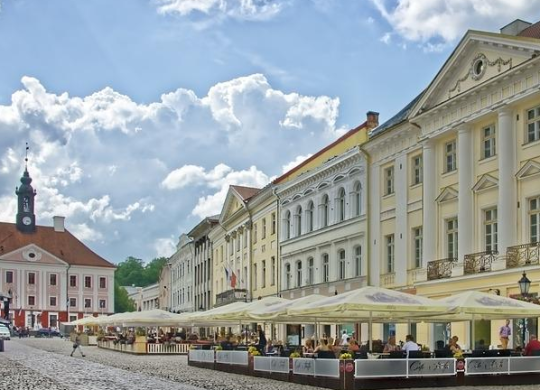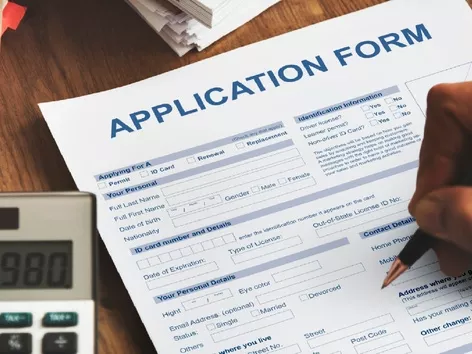Job in Estonia for expats in 2025: labor market, promising vacancies, conditions and procedure for obtaining a work visa
Table of contents
- Labor market in Estonia
- In which sectors and in what positions do expats work in Estonia?
- What is the average salary in Estonia?
- Work culture in Estonia
- Do I need a visa to work in Estonia?
- Requirements for EU citizens to work in Estonia
- Expat requirements for an Estonian visa
- Documents required for a work visa in Estonia
- How to apply for a work visa to Estonia?
- Processing time for a work visa to Estonia
- Cost of a work visa to Estonia
- How long can I stay in Estonia with a work visa?
- Can I extend my work visa in Estonia?
- Is it possible to move with your family?
- Where can an expat look for a job in Estonia?

Estonia is considered the easiest country to get a work visa in due to its high approval rate. The country is also currently experiencing a labor shortage in more than 60 professions, including healthcare, IT, catering, and hospitality. All of these factors are contributing to the expats moving to the country. Find out how to get a work visa and where most foreigners work in Estonia
The Estonian labor market is currently experiencing an acute shortage of workers, especially highly skilled personnel, specialists in the healthcare, IT, catering, hospitality, and manufacturing industries. To address this issue, the country attracts foreign specialists and demonstrates a high level of approval of work visa applications. Such conditions make the country attractive to expats, especially for citizens of Bangladesh, Nepal, the Philippines, and India.
We tell you about the most popular vacancies and requirements for employment in Estonia in 2025 in our material.
Labor market in Estonia
The Estonian labor market is characterized by a high level of employment. The registered unemployment rate in Estonia (with a total population of 1.3 million) is about 6.9%.
The following sectors are expected to provide the most job opportunities: ICT services, highly skilled professionals, water and waste management, energy services, health and social services, arts and recreation.
Estonia is facing a shortage of plumbers, mechatronics and mechanical engineers, as well as combine harvester operators and plywood workers. The manufacturing, electronics and electrical appliances sectors are expected to see significant job growth in the near future. Estonia will also experience a severe shortage of teachers, education support specialists, nurses, security guards and transport drivers.
In which sectors and in what positions do expats work in Estonia?
Estonia is experiencing a labor shortage in more than 60 occupations: livestock farm workers, truck drivers, mechanical machine assemblers, electricians and fitters, agricultural and industrial machine repairers, metalworking machine tool adjusters and operators, sheet metal workers, welders and cutters, painters and related workers, security guards, health care assistants, construction supervisors, production managers, civil engineers, software and application developers and analysts, web and multimedia developers, systems analysts, special needs teachers, educators, teachers, professional nurses, general practitioners/specialists, civil engineers.
On the other hand, Estonia reported six surplus occupations, such as accountants, data entry clerks, interior designers and decorators, administrative and executive secretaries, journalists, and product and clothing designers.
This means that foreigners may find it difficult to find work in these positions due to high competition.
What is the average salary in Estonia?
In 2024, the average salary in Estonia was almost 24,000 euros per year, or 2,000 euros per month. Compared to the rest of Europe, the average salary in Estonia is lower than the average salary in the EU.
In 2024, the minimum wage in Estonia is 820 euros per month. This translates into an annual salary of 9,840 euros. The minimum wage in Estonia is competitive compared to other eurozone countries, such as Eastern Europe, but still low compared to the Scandinavian countries, of which Estonia is increasingly considered a part.
Work culture in Estonia
The Estonian work ethic is pretty simple: do the job, meet the deadlines, and everything will be fine. At work, ask specific questions and give specific answers. Being too vague will get you nowhere.
Estonians also take their vacation seriously. Many people go offline for at least a couple of weeks during the height of summer (June-July) and do not answer (or even check) work emails.
Employment relationships in Estonia are based on a written employment contract.
1. The law provides for (and most positions are accompanied by) a 4-month probationary period, during which it is easier for both you and the employer to terminate the contract if you are not suitable for some valid reason.
2. Most employment contracts are concluded for an indefinite period. To conclude a fixed-term contract, the employer must demonstrate the temporary nature of the work (for example, a short-term increase in volume or seasonal work).
3. The salary is freely negotiated and is usually paid monthly to the employee's bank account.
In order to safely move, travel or work in a new country, you will need health insurance. You can issue an extended policy on our website using the link.
Do I need a visa to work in Estonia?
All non-EU/EEA/Swiss citizens must apply for a work visa if they want to work in Estonia. A work visa is issued for one year, but you must apply for a temporary residence permit if you are staying longer than one year.
Requirements for EU citizens to work in Estonia
EU/EEA/Swiss citizens do not need to apply for a work visa to work in Estonia. They only need to register as residents of Estonia in the Estonian Population Register for the first three months of their stay and apply for an identity card within the first month of their stay in Estonia.
Expat requirements for an Estonian visa
To apply for an Estonian work visa, you must meet the following conditions:
- Your employer must register your employment with the Estonian Police and Border Guard Board in advance.
- You must have a valid employment contract.
- Provide the necessary qualifications for the position.
- Must be in good health.
Documents required for a work visa in Estonia
To obtain an Estonian work visa, you must provide the following documents:
- Valid passport – at least three months after the date of return and have two blank pages.
- Two passport-sized photos – the photos must be taken within the last six months.
- Application form – fill out the application form online.
- Paid consular fee – after filling out the application form, you must pay for your visa application.
- Medical insurance.
- Proof of residence. A document confirming that you have a place to stay during your stay in Estonia. Such a document can be a contract or lease agreement, an invitation letter, etc.
- Cover letter.
- Certificate of no criminal record.
- An employment contract that specifies the type of work you will do in Estonia, the salary, the duration of your work, etc.
- Documents about your personal qualifications: diploma of education, your CV, your driver's license (if any), etc.
Important! You must have the documents translated into Estonian or English. The documents must be originals or notarized. Keep in mind that the Estonian embassy may request any additional documents; submit everything they request, as the lack of documents may result in the refusal of your visa.
How to apply for a work visa to Estonia?
The process of applying for a work visa to Estonia is as follows:
Stage 1 - Registration of work in Estonia.
Your employer must register your work in Estonia. This document allows you to work in Estonia until you receive a residence permit. Provide your employer with a copy of your passport, a photo, and other necessary personal data. You will then receive an identification code, an 11-digit number that is used to identify your details in Estonia.
Step 2 – Apply for a work visa at the Estonian embassy in your country.
Contact the nearest Estonian embassy/consulate in your country and make an appointment. You may need to have an interview during your visa appointment, so be sure to arrive on time. Next, you need to collect and submit all the necessary documents to the Estonian embassy.
After completing all the requested steps, wait for a response. You will receive a response from the embassy/consulate with the result of your visa application. They will contact you by email or text message.
Step 3 – After entering Estonia, obtain a residence permit.
After entering Estonia, you must make an appointment with the border police and apply for a residence permit in Estonia. You must personally submit all the required documents to the Estonian Police and Border Guard Board (PBGB).
It takes up to two months to obtain a residence permit.
Processing time for a work visa to Estonia
The processing time for a work visa to Estonia is 30 days. However, the processing time can be extended, as it depends on several factors. For example, it depends on your case, political reasons or the time of application.
Cost of a work visa to Estonia
The Estonian work visa fee is 100 euros. Payment can be made in cash or by card.
How long can I stay in Estonia with a work visa?
The Estonian work visa is valid for 365 days. If you want to stay longer, you must apply for a temporary residence permit after entering Estonia, which is issued for up to five years and can be extended.
Can I extend my work visa in Estonia?
You can extend your work visa in Estonia at least three working days before the visa expires.
Is it possible to move with your family?
You can bring your family members with an Estonian work visa. Your family members are allowed to work, study and stay in Estonia.
Where can an expat look for a job in Estonia?
Most expats look for a job in Estonia on one of the following portals:
- If you are from the EU/EFTA region, you can find a job in Estonia on the EURES (European Employment Service) website. EURES is a network of job portals supported by the European Commission and designed to facilitate free movement within the EU.
- Job sites: workinestonia.com, CV-Online, CV Market.
Estonia is a European country that is a promising destination for expats to move to, as it has a high standard of living, a developed social sphere and good career prospects.
Let us remind you! Estonia is recognized as the most developed Baltic country in terms of economic indicators and standard of living. It is developing rapidly, and the average salary exceeds 1000 euros per month. We have already told you how to move to Estonia in 2025, what are the grounds for obtaining Estonian citizenship, as well as the pros and cons of moving.
Igor Usyk - Head of Migration department at VisitWorld
To ensure a safe move to a new country, I advise you to consult a specialist. My colleagues, qualified specialists with a legal education, will help you avoid unpleasant situations during migration.
Products from Visit World for a comfortable trip:
Checklist for obtaining a visa and necessary documents for Estonia;
Legal advice on immigration to Estonia;
Travel insurance for foreigners in Estonia;
Medical insurance all over the world.
Recommended articles
3 min
Work
Finland is known as a safe country that values a healthy work-life balance and offers great opportunities for foreign workers. Find out what it takes to get a job here in 2025 and what legislative changes are important for expats to know before applying for a job.
21 gru. 2024
More details2 min
Employment
Estonia has eased the rules for obtaining an EU Blue Card
Estonia is introducing lenient rules for the EU Blue Card. Such innovations are needed to fill the shortage of labor resources in various industries. Learn more about obtaining an EU Blue Card for third-country nationals in Estonia in 2024
17 maj. 2024
More details1 min
Work
How to get a job in Iceland for foreigners: legal aspects
Iceland is a promising country for expats to find work, but any move is always associated with bureaucratic difficulties. Find out what are the legal aspects of getting a job in Iceland and how to resolve them
25 gru. 2024
More details1 min
Employment
Working abroad is a dream for many foreigners in different parts of the world. However, the employment procedure is associated with certain difficulties, including obtaining a visa and finding the best vacancy. Find out which work visas are recognized as the best for employment in 2025 and which specialists are in the highest demand
30 gru. 2024
More detailsAll materials and articles are owned by VisitWorld.Today and are protected by international intellectual property regulations. When using materials, approval from VisitWorld.Today is required.
